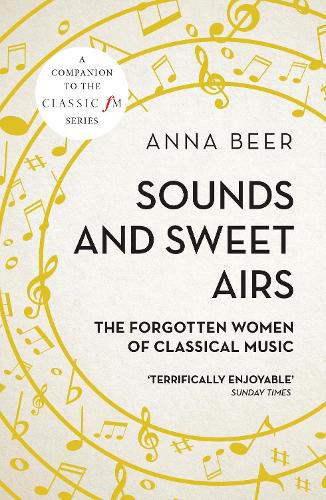Readings Newsletter
Become a Readings Member to make your shopping experience even easier.
Sign in or sign up for free!
You’re not far away from qualifying for FREE standard shipping within Australia
You’ve qualified for FREE standard shipping within Australia
The cart is loading…






A long- overdue celebration of neglected virtuosos, Sounds and Sweet Airs presents a complex and inspirational picture of artistic endeavour and achievement that deserves to be part of our cultural heritage.
The featured composers are Francesca Caccini, Barbara Strozzi, Elisabeth Jacquet de la Guerre, Marianna Martines, Fanny Hensel (nee Mendelssohn), Clara Schumann, Lili Boulanger and Elizabeth Maconchy.
$9.00 standard shipping within Australia
FREE standard shipping within Australia for orders over $100.00
Express & International shipping calculated at checkout
A long- overdue celebration of neglected virtuosos, Sounds and Sweet Airs presents a complex and inspirational picture of artistic endeavour and achievement that deserves to be part of our cultural heritage.
The featured composers are Francesca Caccini, Barbara Strozzi, Elisabeth Jacquet de la Guerre, Marianna Martines, Fanny Hensel (nee Mendelssohn), Clara Schumann, Lili Boulanger and Elizabeth Maconchy.
Every page of Anna Beer’s Sounds and Sweet Airs – a study of forgotten female composers – contains a tempting distraction. With each reference to a composition, I reach over to my phone or computer to find the music. Knowing little of Beer’s subjects, I am curious: is their music rightfully overlooked, or is it simply because they’re women? More than that – are they forgotten because they’re women pursuing success in what has throughout history been considered a man’s world?
Beer’s first subject, Francesca Caccini (1587–1640), is familiar to me – musicologist Suzanne Cusick has previously uncovered fascinating insights into the composer’s life, and I have performed her music. However, Caccini’s story is a remarkable one worth retelling. Born into a musical family, Caccini possessed an uncommonly beautiful singing voice, and she went on to serve the Florentine Medici court as composer, teacher and performer. But, like other composers featured in Beer’s book, Caccini’s life is now merely an adjunct to her more famous father’s.
Barbara Strozzi (1619–1677) found favour as a courtesan – avoiding the two restrictive women’s paths of marriage or the convent – allowing her to compose and publish (albeit ‘musical miniatures, such as arias and cantatas’) until her death. Marriana Martines (1744–1812), a composer and singer of prodigious talent (do yourself a favour and listen to her music), is now just a blip on the classical landscape. What links all these women – apart from their present undeserved obscurity – is their absolute dedication to their extraordinary music, often at the expense of reputation and family. Prepare to be outraged: these women have been overlooked for their gender, and not the quality of their music. Beer writes in an informed and accessible style, and she brings her subjects to life. Sounds and Sweet Airs is compulsory reading for lovers of music and history: it will open your eyes to a rich and inspiring world.